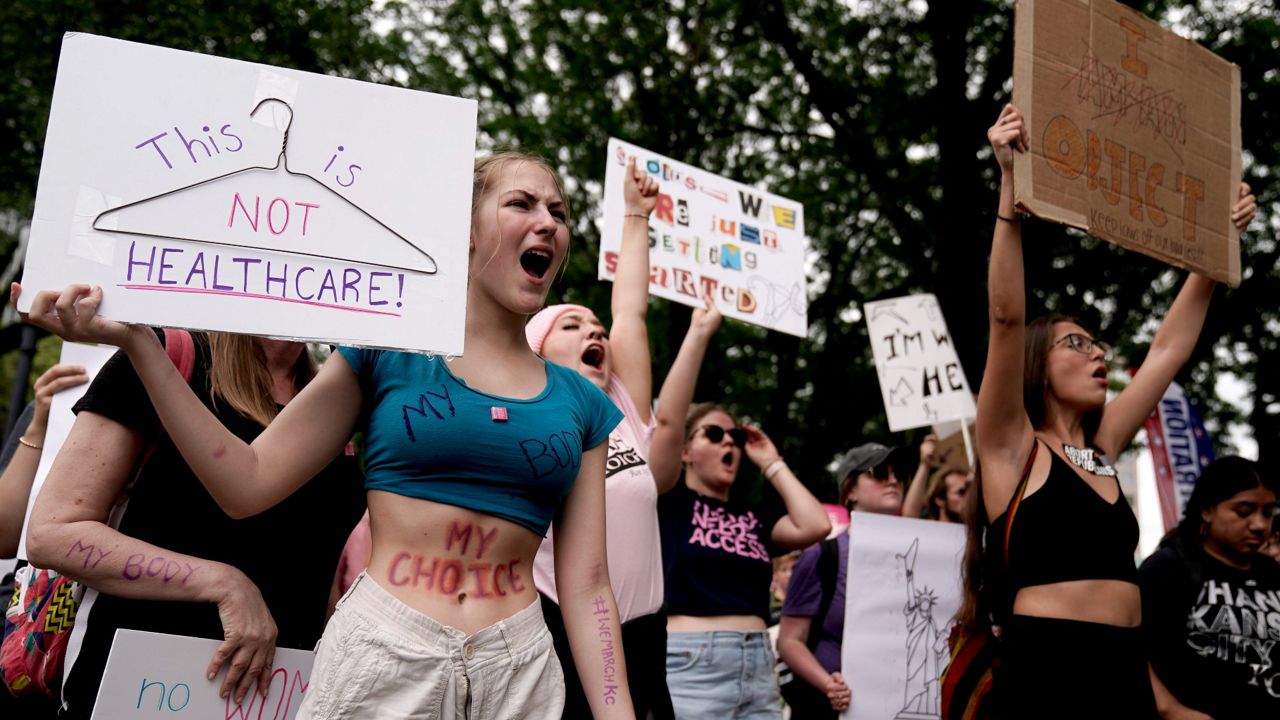Facing pressure from voters upset about last month’s Supreme Court ruling that reversed the constitutional right to abortion, congressional Democrats are responding with legislation.
The House passed two abortion-related bills on Friday, sending the measures to the Senate, where they face long odds.
What You Need To Know
- Facing pressure from voters upset about last month’s Supreme Court ruling that reversed the constitutional right to abortion, congressional Democrats are responding with legislation
- The House passed two abortion-related bills Friday — one that would restore the right to abortion nationwide, another that would bar states from preventing, restricting or retaliating against a woman who travels across states lines for legal abortions
- Senate Democrats also have introduced their own legislation to protect patients’ ability to travel across state lines for abortions
- The bills are expected to fail in the Senate, but allow Democrats to demonstrate to voters they are trying to mitigate the impact of the Supreme Court ruling while putting Republicans on the record ahead of this fall’s midterm elections.
"It's outrageous that 50 years later, women must again fight for our most basic rights against an extremist court and Republican Party," House Speaker Nancy Pelosi, D-Calif., said at a news conference on Friday. "Democrats are honoring the basic truth: women's most intimate health decisions are her own."
One, called the Women’s Health Protection Act, would restore the right to abortion nationwide. The House passed the same bill in September, but it was blocked twice in the evenly divided Senate, where it needed 60 votes to overcome a filibuster.
The House passed the bill in a near-party line vote, 219-210, with just Democratic Rep. Henry Cuellar of Texas voting with all Republicans against the measure.
The other bill, the Ensuring Access to Abortion Act, would bar states from preventing, restricting or retaliating against a woman who travels across states lines for legal abortions.
The measure passed in a 223-205 vote, with three Republicans joining all present Democrats in supporting the bill.
“Our caucus has been hard at work assembling a robust and resolute legislative response to the Supreme Court's assault on reproductive rights,” Speaker Nancy Pelosi said on the House floor Wednesday.
Both measures face steep odds in the evenly divided Senate.
Senate Democrats also have introduced their own legislation to protect patients’ ability to travel across state lines for abortions. Sen. Catherine Cortez Masto, D-Nev., one of the bill’s lead sponsors, sought unanimous consent for the proposal Thursday, but Sen. James Lankford objected.
“Does that child in the womb have the right to travel in their future?” Lankford said. “Do they get to live? There’s a child in this conversation as well."
Cortez Masto tweeted: “Senate Republicans just blocked my bill to protect women who travel for reproductive care and those who help them. They want to allow state legislators to reach across state lines to punish and control women. It’s absolutely outrageous. I won't stop fighting for women's freedom.”
"Immediately after Roe was reversed, I laid out how our Administration would use executive action to protect a woman’s right to travel across state borders to get the care she needs," President Joe Biden wrote in a Twitter post after Lankford's objection. "Today, Senate Republicans blocked a bill that would make that right a law."
Last month, the Supreme Court overturned Roe v. Wade, giving state legislatures the authority to decide their own abortion laws. Twenty states have passed laws to ban or mostly ban abortion, and others are expected to follow.
Due to opposition from Senate Republicans as well as moderate Democratic Sen. Joe Manchin of West Virginia, Democrats’ efforts in Congress are likely to fail. But by introducing legislation, Democrats are demonstrating to voters they are trying to mitigate the impact of the Supreme Court ruling while putting Republicans on the record ahead of this fall’s midterm elections.
Speaking in Florida on Thursday, Vice President Kamala Harris slammed “so-called leaders who are in the process of punishing doctors and criminalizing women who want to make decisions for themselves," before calling on voters to elect "two additional U.S. Senators" to protect abortion rights.
Pelosi echoed Harris' sentiments in her Friday news conference.
"We must ensure that the American people remember in November, because with two more Democratic senators, we will be able to eliminate the filibuster when it comes to a woman's right to choose and to make reproductive freedom the law of the land," she said.
Sen. Bill Cassidy, R-La., told Politico the travel bill is just for show.
“How are you going to keep somebody from traveling (for an abortion)?” he said. “That’s silly. And they know it’s silly, but they’re just trying to fool the American people into thinking they’re doing something significant.”
However, even before the Supreme Court ruling, a Missouri state lawmaker proposed allowing private citizens to sue anyone who helps a resident have an abortion, including those who transport the patient across states lines and the out-of-state doctor. And the Thomas More Society, a conservative legal organization, is drafting similar model legislation for state legislatures, The Washington Post reported.
“States are looking to ban it,” Cortez Masto told reporters Tuesday. “And we already know that it is having a chilling effect as states work to criminalize doctors and criminalize women.”
Sen. Susan Collins, R-Maine, a Republican who supports abortion rights, did not comment about the specific bill introduced by Sen. Cortez Masto, but told reporters that she supports the rights of Americans to travel for medical procedures.
"I certainly do want people to be able to travel freely, just as they can for any medical procedure," Collins said Thursday to HuffPost. "So I don't think abortion should be treated differently."
A University of Texas at Austin study earlier this year found that nearly 1,400 Texas residents travel out of state each month for abortion care.
“While lawmakers and others in several states, including my home state of Texas, are threatening to interfere with the constitutional right of Americans to travel freely and voluntarily within the United States, the Congress is acting to protect the fundamental freedoms of Americans,” Rep. Lizzie Fletcher, D-Texas, who sponsored the House travel bill, said in a statement Wednesday.
Axios reported Thursday that congressional Democrats also are preparing proposals to protect other rights they believe are in jeopardy. In a concurring opinion in Dobbs v. Jackson Women’s Health — the case that led to the Supreme Court striking down Roe — conservative Justice Clarence Thomas wrote that the court should "reconsider all of this Court’s substantive due process precedents, including Griswold, Lawrence and Obergefell.” Those rulings protect contraceptive access and same-sex intimacy and marriage.
Democrats also plan to introduce legislation that would protect the privacy of patients’ health records amid fears that law enforcement officials could use the information to track pregnancies in search of illegal abortions, The New York Times reported.
Meanwhile, congressional Democrats continue to pressure President Biden to wield more of his executive authority on abortion.
On Thursday, 18 Senate Democrats, led by Sen. Elizabeth Warren, D-Mass., sent a letter urging Biden to declare national and public health emergencies, which would free up federal resources to promote abortion access.
“Millions of American women have been endangered by the Supreme Court’s reckless decision to overturn Roe v. Wade and eliminate the constitutional right to an abortion,” the letter says.
More than 80 House Democrats sent Biden a similar letter Tuesday.
Biden said last weekend he is considering the possibility, although Jen Klein, director of the White House Gender Policy Council, earlier said it “didn’t seem like a great option.”
Last week, Biden signed an executive order aimed at pushing back on efforts to limit the ability of women to access federally approved abortion medication or to travel across state lines to access clinical abortion services.
Note: This article was updated with a quote from Sen. James Lankford.
Ryan Chatelain - Digital Media Producer
Ryan Chatelain is a national news digital content producer for Spectrum News and is based in New York City. He has previously covered both news and sports for WFAN Sports Radio, CBS New York, Newsday, amNewYork and The Courier in his home state of Louisiana.








